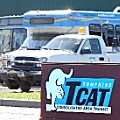- By Patty Poist
- News
 Print
Print  TCAT announced Tuesday that Cornell University has committed to increase its fare payment to TCAT, Inc. for the next three years by a total of $1,125,000.
TCAT announced Tuesday that Cornell University has committed to increase its fare payment to TCAT, Inc. for the next three years by a total of $1,125,000.At present, Cornell pays nearly $2.6 million each year via a volume discount plan for passes added to ID cards for students, employees and retirees either via discounts offered by the university or free for first‑year students or other members of the Cornell community. As an example, all registered students can ride free after 6 p.m. and on weekends simply by using their IDs at the farebox. Cornell IDs, used as bus passes in 2013, accounted for 71.4 percent of all of TCAT's ridership.
Though not documented with a written contract, there was an understanding that Cornell would pay $1 per ride, which is the approximate cost per ride for a non‑Cornell passenger with a monthly pass who commutes to and from work five days a week. Since Cornell's ridership has increased over the past several years, the average payment per ride for Cornell ID usage has shrunk to 83 cents per ride.
To that end, a delegation of TCAT board members, led by TCAT Board Vice‑Chairman Frank Proto, recently met with President Skorton to bridge this funding gap, which in 2013 amounted to a deficit of approximately $540,000 using the $1‑ per‑ ride formula.
Please note: TCAT's fiscal year is calendar year and Cornell's fiscal year is July 1 to June 30.
Cornell's newly announced payment plan is:
- July 1, 2015 (TCAT's FY15 and CU's FY16) - $2,600,000 + $250,000 = $2,850,000
- July 1, 2016 (TCAT's FY16 and CU's FY17) - $2,600,000 + $375,000 = $2,975,000
- July 1, 2017 (TCAT's FY17 and CU's FY18) - $2,600,000 + $500,000 = $3,100,000
If Cornell did not increase its payment over the next 3 years the total payment would have been $7,800,000. With the increased payment agreement, Cornell will pay a total of $8,925,000 over the next 3 years. This is an increase of $1,125,000 (or 14.4 percent) over the next 3 years.
In addition, President Skorton has suggested that the university enter into a Memorandum of Understanding with the TCAT Board of Directors that "spells out the current and future Cornell payments for the rides it purchases for students, faculty and staff."
"We thank the President for his commitment to help maintain the excellent level of service provided to the Cornell community as well as the entire Tompkins County area," said TCAT General Manager Joe Turcotte. "The Memorandum of Understanding will provide the framework between CU and TCAT for supporting the passenger fare system and will allow for more predictable budgeting."
President Skorton also has asked Cornell's Transportation Services to create a task force with broad university representation, which will include students "to advise our administration on proposed actions to identify the additional annual revenue for our increased TCAT fare payments."
"We applaud both President Skorton, as well as a delegation of our board members led by TCAT Board Vice Chairman Frank Proto, for all sitting down together to figure out ways to help us maintain what has been a highly successful transit operation," Turcotte said. "We believe President Skorton's suggestion to create a task force made up of a broad representation of the university is a great step in the right direction."
"TCAT, like other smaller upstate New York transit agencies – as well as many other transit agencies all over the country – continually faces the challenge of finding resources to meet ridership demand. As statistics show, more and more younger people are choosing transit over driving their own vehicles or are even delaying getting their drivers' licenses, which was a cherished rite of passage for earlier generations," Turcotte said.
"Overall, ridership demand is a good problem to have, but if we can't meet demand due to lack of resources, we fear that trend will go in the opposite direction," Turcotte said.
Under a separate contract titled 'Transportation Agreement' among Cornell, the City of Ithaca, Tompkins County and TCAT, Inc., each of the first three entities annually pays for part of TCAT's operational and capital expenses in exchange for TCAT's provision of transit services. This year, each entity paid TCAT $830,000 toward TCAT's operational budget and $110,000 to TCAT's capital budget.
v10i39



